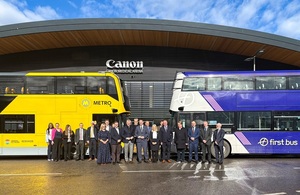March 17 2025
The CPT’s Director of Policy and External Relations, Alison Edwards, reports from the inaugural meeting of the UK Bus Manufacturing Panel, convened to confront the challenges of the zero emission transition.
There is beauty in variety – and you will find many different designs of buses on Britain’s roads. Collectively, the CPT’s members have huge expertise in fleet, technology and passengers’ requirements.
So it was a pleasure to represent the CPT alongside other industry experts, plus the mayors of South Yorkshire and West Yorkshire and representatives from the other Mayoral authorities, at the inaugural meeting of the UK Bus Manufacturing Panel in Sheffield last week.
Hosted by the Minister for Buses and Local Transport, Simon Lightwood MP, the remit of the panel is to bring experts together to ensure the UK remains a leader in bus manufacturing, particularly as we move towards a zero emission bus fleet. From the CPT’s perspective, actions to improve the pipeline of zero emission bus orders can help all our members, wherever their activities are based, and smooth our path to a zero emission bus fleet.
On the zero emission transition, a frustration for operators is the time it takes to connect depots to the grid for electric charging infrastructure. More broadly, there is a need for clarity in policy to enable investment to be planned, and manufacturers to gear up production. As we wait to see how franchising pans out in big cities, there is a risk of an ‘investment blight’ in zero emission buses.
None of this is unsurmountable. A clear government strategy, with a timeline, for the transition, is needed, and we are seeing the early seeds of this emerging from the Bus Services Bill as it makes its way through parliament. And we hope that the Spending Review in June will deliver a commitment over the Government’s plan for funding.
Themes to be examined by the new panel include whether and how bulk orders, and a more standardised approach to bus design, could bring down costs. A number of Mayors – including the Liverpool City Region - are getting involved in bus purchase and ownership. If they do so, the CPT is urging them to consult with both operators and passengers.
Operators bring huge experience on what works best, including less obvious passenger benefits – such as safety features, driver comfort and inclusive cab designs which consider women as well as men.
Standardisation can only go so far – different communities, and geographies, have different needs. And smaller, independent operators, suppliers and manufacturers provide a valuable role which must be included in any industry-wide thinking.
The panel is a welcome step forward but it will only thrive if we all bring perspectives to the table. CPT members are urged to get in touch with any views they would like us to represent on design, purchasing and manufacturing of fleet. This panel, and the ambitions behind it, provide an exciting opportunity for bus manufacturing and our transition to zero emission fleets. But we can only turn these ambitions into realities if the experts – you – are involved.
